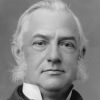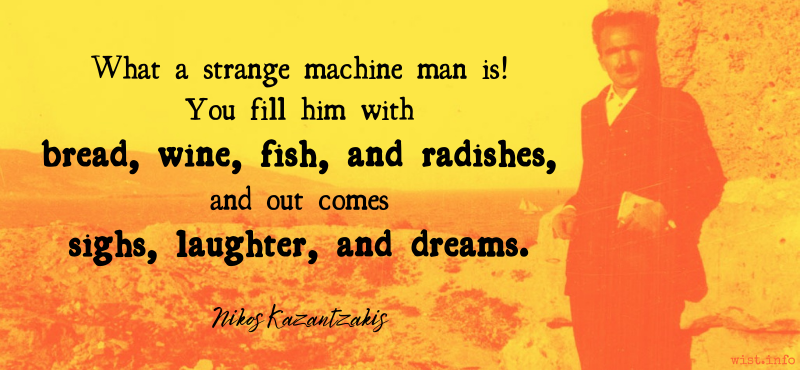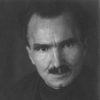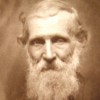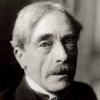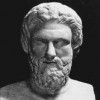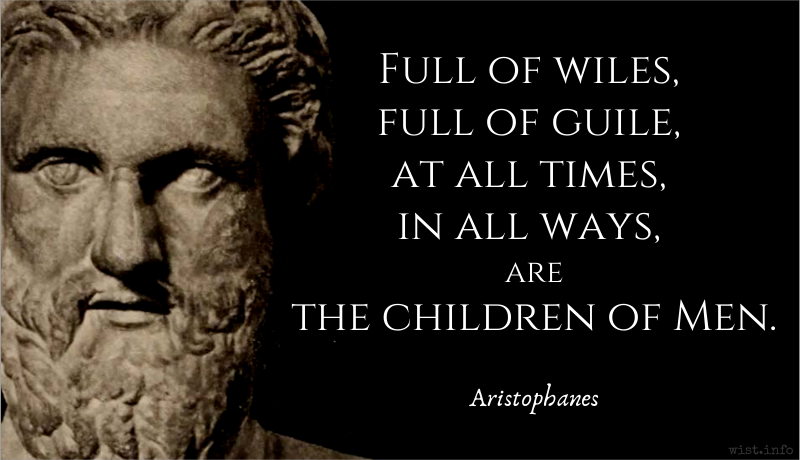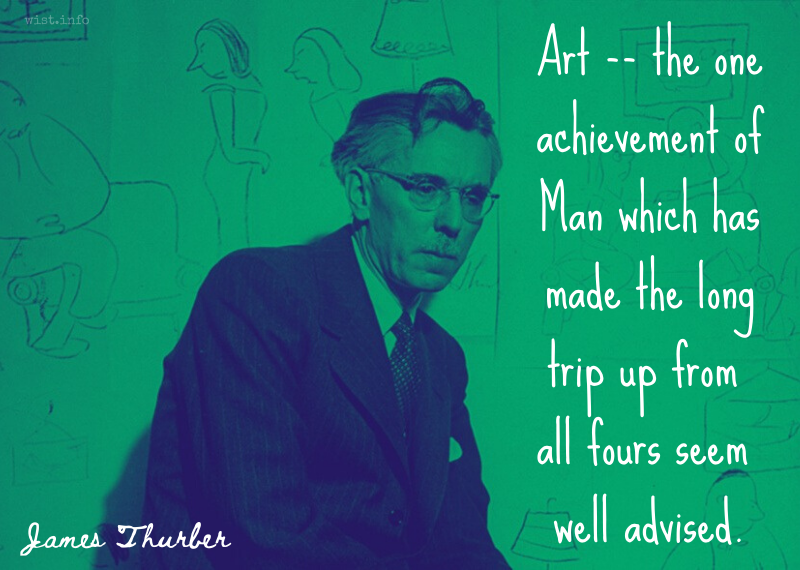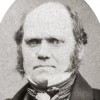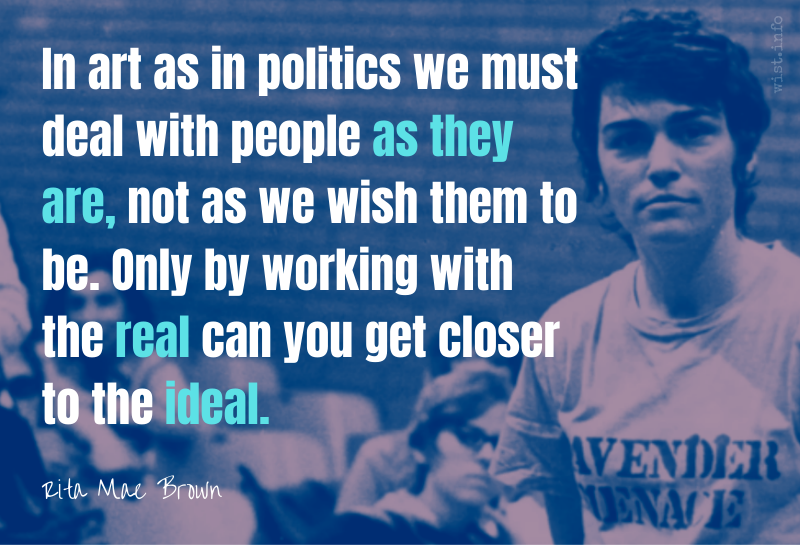“All right,” said Susan. “I’m not stupid. You’re saying humans need … fantasies to make life bearable.”
REALLY? AS IF IT WAS SOME KIND OF PINK PILL? NO. HUMANS NEED FANTASY TO BE HUMAN. TO BE THE PLACE WHERE THE FALLING ANGEL MEETS THE RISING APE.
“Tooth fairies? Hogfathers? Little –”
YES. AS PRACTICE. YOU HAVE TO START OUT LEARNING TO BELIEVE THE LITTLE LIES.
“So we can believe the big ones?”
YES. JUSTICE. MERCY. DUTY. THAT SORT OF THING.
“They’re not the same at all!”
YOU THINK SO? THEN TAKE THE UNIVERSE AND GRIND IT DOWN TO THE FINEST POWDER AND SIEVE IT THROUGH THE FINEST SIEVE AND THEN SHOW ME ONE ATOM OF JUSTICE, ONE MOLECULE OF MERCY. AND YET — Death waved a hand. AND YET YOU ACT AS IF THERE IS SOME IDEAL ORDER IN THE WORLD, AS IF THERE IS SOME … SOME RIGHTNESS IN THE UNIVERSE BY WHICH IT MAY BE JUDGED.
“Yes, but people have got to believe that, or what’s the point –”
MY POINT EXACTLY.
Quotations about:
humanity
Note not all quotations have been tagged, so Search may find additional quotes on this topic.
No matter how black, white, male, female, Irish, German, tall, short, ugly or pretty you felt this year, you are part of a family that has been targeted by an unforgiving cosmos since its inception but has, regardless, survived. If a TV show about this family were to be created, you would very, very much enjoy it, and pay very much money for several seasons of it on DVD, because humanity, warts and all, is an inherently heroic species that has spent about 99.99% of its short lifetime as an underdog. And If you see no billboards telling you that, it’s not because it’s not true. It’s because there’s little to no profit to be made telling you.
I could go on and on about the suffering we’ve endured and the adaptations we’ve made, but to me, our species’ crowning jewel is that on the shortest day of the year, when the sun spends most of its time swallowed, when everything is frozen, when nothing can grow, when the air is so cold our voices stop right in front of our faces … we put a string of lights on a universe that is currently doing nothing to earn it. We not only salvage an otherwise desolate time of year, we make it the best time of year.
Dan Harmon (b. 1973) American writer, producer, entertainer
“Drunk High Christmas Greetings!” blog entry, DanHarmon.com (26 Dec 2008)
(Source)
Angels are souls blown into lights,
Jinn are souls blown into winds,
and Human Beings are souls blown into shapes.Ibn 'Arabi (1165-1240) Arab Andalusian Muslim scholar, Sufi mystic, poet, philosopher [ابن عربي]
(Attributed)
(Source)
Whether listening to the shrieks of the Shaman sorcerers of Tatary, or to the odes of Pindar, or to the sacred songs of Paul Gerhard; whether looking at the pagodas of China, or the Parthenon of Athens, or the cathedral of Cologne; whether reading the sacred books of the Buddhists, of the Jews, or of those who worship God in spirit and in truth, we ought to be able to say, like the Emperor Maximilian, “Homo sum, humani nihil a me alienum puto;” or, translating his words somewhat freely, “I am a man; nothing pertaining to man I deem foreign to myself.”
Max Müller (1823-1900) German-British philologist, Orientalist, religious studies founder
Chips from a German Workshop, “Lecture on the Vedas” (1866)
(Source)
“People aren’t either wicked or noble,” the hook-handed man said. “They’re like chef salads, with good things and bad things chopped and mixed together in a vinaigrette of confusion and conflict.”
Everybody needs beauty as well as bread, places to play in and pray in, where Nature may heal and cheer and give strength to body and soul alike. This natural beauty-hunger is made manifest in the little window-sill gardens of the poor, though perhaps only a geranium slip in a broken cup, as well as in the carefully tended rose and lily gardens of the rich, the thousands of spacious city parks and botanical gardens, and in our magnificent National parks.
John Muir (1838-1914) Scottish-American naturalist
The Yosemite, ch. 15 “Hetch Hetchy Valley” (1912)
(Source)
A lot of the arguments about religion going on at the moment spring from a rather inept understanding of religious truth. Our notion changed during the early modern period when we became convinced that the only path to any kind of truth was reason. That works beautifully for science but doesn’t work so well for the humanities. Religion is really an art form and a struggle to find value and meaning amid the ghastly tragedy of human life.
Karen Armstrong (b. 1944) British author, comparative religion scholar
“The Reason of Faith,” Interview with Michael Brunton, Ode (Sep-Oct 2009)
(Source)
I am a weak, ephemeral creature made of mud and dream. But I feel all the powers of the universe whirling within me.
Nikos Kazantzakis (1883-1957) Greek writer and philosopher
The Saviors of God [Salvatores Dei], “The Preparation: Second Duty,” #22 (1923) [tr. Friar [1960])
(Source)
Which is it? Is man one of God’s blunders? Or is God one of man’s blunders?
[Wie? ist der Mensch nur ein Fehlgriff Gottes? Oder Gott nur ein Fehlgriff des Menschen?]
Friedrich Nietzsche (1844-1900) German philosopher and poet
Twilight of the Idols [Die Götzen-Dämmerung], “Apophthegms and Darts [Sprüche und Pfeile]” #7 (1889)
Alt. trans.:
- "How is it? Is man only a mistake of God? Or God only a mistake of man? --" [tr. Common (1896)]
- "What? Is man just one of God's mistakes? Or is God just one of man's? --" [tr. Large (1998),"Maxims and Barbs"]
- "What? Is man just God's mistake? Or is God just man's mistake?" [tr. Norman (2005), "Arrows and Epigrams"]
- "What? Is man merely a mistake of God's? Or God merely a mistake of man's?" [tr. Hollingdale (1968)]
- "Which is it? Is man only a blunder of God? Or is God only a blunder of man?" [tr. Ludovici (1911), "Maxims and Missiles"]
When great causes are on the move in the world, stirring all men’s souls, drawing them from their firesides, casting aside comfort, wealth, and the pursuit of happiness in response to impulses at once awe-striking and irresistible, we learn that we are spirits, not animals, and that something is going on in space and time, and beyond space and time, which, whether we like it or not, spells duty.
Winston Churchill (1874-1965) British statesman and author
BBC Radio broadcast (16 Jun 1941)
(Source)
First published in the Imperial Review (28 Jun 1941).
The history of the human race is a continual struggle from darkness towards light. It is, therefore, to no purpose to discuss the use of knowledge; man wants to know, and when he ceases to do so, he is no longer man.
Fridtjof Nansen (1861-1930) Norwegian explorer, scientist, diplomat, humanitarian
“A New Route to the North Pole,” The Forum (Aug 1891)
(Source)
For the wonderful thing about saints is that they were human. They lost their tempers, got hungry, scolded God, were egotistical or testy or impatient in their turns, made mistakes and regretted them. Still they went on doggedly blundering toward heaven.
That men should pray and fight for their own freedom, and yet keep others in slavery, is certainly acting a very inconsistent, as well as unjust and, perhaps, impious part, but the history of mankind is filled with instances of human improprieties.
John Jay (1745-1829) American statesman, diplomat, abolitionist, politician, Chief Justice (1789-1795)
Letter to Rev. Doctor Price (27 Sep 1785)
(Source)
Men may be divided almost any way we please, but I have found the most useful distinction to be made between those who devote their lives to conjugating the verb “to be” and those who spend their lives conjugating the verb “to have.”
Sydney J. Harris (1917-1986) Anglo-American columnist, journalist, author
For the Time Being, ch. 6, epigram (1972)
(Source)
Man, in his present state, appears to be a degraded creature; his best gold is mixed with dross, and his best motives are very far from being pure and free from earth and impurity.
John Jay (1745-1829) American statesman, diplomat, abolitionist, politician, Chief Justice (1789-1795)
Letter to Lindley Murray (22 Aug 1774)
(Source)
As is the generation of leaves, so is that of humanity.
The wind scatters the leaves on the ground, but the live timber
Burgeons with leaves again in the season of spring returning.
So one generation of men will grow while another dies.[Οἵη περ φύλλων γενεὴ τοίη δὲ καὶ ἀνδρῶν.
φύλλα τὰ μέν τ’ ἄνεμος χαμάδις χέει, ἄλλα δέ θ’ ὕλη
τηλεθόωσα φύει, ἔαρος δ’ ἐπιγίγνεται ὥρη·
ὣς ἀνδρῶν γενεὴ ἣ μὲν φύει ἣ δ’ ἀπολήγει.]Homer (fl. 7th-8th C. BC) Greek author
The Iliad [Ἰλιάς], Book 6, l. 146ff (6.146-149) (c. 750 BC) [tr. Lattimore (1951)]
(Source)
Like the race of leaves
The race of man is, that deserves no question; nor receives
My being any other breath? The wind in autumn strows
The earth with old leaves, then the spring the woods with new endows;
And so death scatters men on earth, so life puts out again
Man’s leavy issue.
[tr. Chapman (1611), l. 141ff]
Like leaves on trees the race of man is found,
Now green in youth, now withering on the ground:
Another race the following spring supplies,
They fall successive, and successive rise:
So generations in their course decay;
So flourish these, when those are past away.
[tr. Pope (1715-20)]
For, as the leaves, such is the race of man.
The wind shakes down the leaves, the budding grove
Soon teems with others, and in spring they grow.
So pass mankind. One generation meets
Its destined period, and a new succeeds.
[tr. Cowper (1791), l. 175ff]
As is the race of leaves, even such is the race of men. Some leaves the wind sheds upon the ground, but the fructifying wood produces others, and these grow up in the season of spring. Such is the generation of men; one produces, another ceases.
[tr. Buckley (1860)]
The race of man is as the race of leaves:
Of leaves, one generation by the wind
Is scatter'd on the earth; another soon
In spring's luxuriant verdure bursts to light.
So with our race; these flourish, those decay.
[tr. Derby (1864)]
Even as are the generations of leaves such are those likewise of men; the leaves that be the wind scattereth on the earth, and the forest buddeth and putteth forth more again, when the season of spring is at hand; so of the generations of men one putteth forth and another ceaseth.
[tr. Leaf/Lang/Myers (1891)]
Men come and go as leaves year by year upon the trees. Those of autumn the wind sheds upon the ground, but when spring returns the forest buds forth with fresh vines. Even so is it with the generations of mankind, the new spring up as the old are passing away.
[tr. Butler (1898)]
Even as are the generations of leaves, such are those also of men. As for the leaves, the wind scattereth some upon the earth, but the forest, as it bourgeons, putteth forth others when the season of spring is come; even so of men one generation springeth up and another passeth away.
[tr. Murray (1924)]
Very like leaves upon this earth are the generations of men -- old leaves, cast on the ground by wind, young leaves the greening forest bears when spring comes in. So mortals pass; one generation flowers even as another dies away.
[tr. Fitzgerald (1974)]
Like the generations of leaves, the lives of mortal men.
Now the wind scatters the old leaves across the earth,
now the living timber bursts with the new buds
and spring comes round again. And so with men:
as one generation comes to life, another dies away.
[tr. Fagles (1990), ll. 171-75]
Man’s greatest blunder has been in trying to make peace with the skies instead of making peace with his neighbors.
Elbert Hubbard (1856-1915) American writer, businessman, philosopher
In The Philistine (Sep 1910)
(Source)
Reprinted in The Philosophy of Elbert Hubbard, "Epigrams" (1916) [ed. Hoyle].
It is not murder which is forgiven but the killer, his person as it appears in circumstances and intentions. The trouble with the Nazi criminals was precisely that they renounced voluntarily all personal qualities, as if nobody were left to be either punished or forgiven. They protested time and again that they had never done anything out of their own initiative, that they had no intentions whatsoever, good or bad, and that they only obeyed orders.
To put it another way: the greatest evil perpetrated is the evil committed by nobodies, that is, by human beings who refuse to be persons.
Hannah Arendt (1906-1975) German-American philosopher, political theorist
“Some Questions of Moral Philosophy,” Lecture (1965-66)
(Source)
Reprinted in Responsibility and Judgment (2003).
There is a raging tiger inside every man whom God put on this earth. Every man worthy of the respect of his children spends his life building inside himself a cage to pen that tiger in.
Murray Kempton (1917-1997) American journalist.
America Comes of Middle Age: Columns, 1950-1962 (1963)
(Source)
I must respekt thoze, I suppose, who never make enny blunders, but I don’t luv them.
[I must respect those, I suppose, who never make any blunders, but I don’t love them.]
Josh Billings (1818-1885) American humorist, aphorist [pseud. of Henry Wheeler Shaw]
Everybody’s Friend, Or; Josh Billing’s Encyclopedia and Proverbial Philosophy of Wit and Humor, “Affurisms” (1874)
(Source)
MORDEN: Think about it, Captain. Look at the long history of human struggle. Six thousand years of recorded wars, bloodshed, atrocities beyond description. But look at what came out of all that. We’ve gone to the stars. Split the atom. Written sonnets. We would never have evolved this far if we hadn’t been at each other’s throats, evolving our way up inch by inch.
To believe that man’s aggressiveness or territoriality is in the nature of the beast is to mistake some men for all men, contemporary society for all possible societies, and, by a remarkable transformation, to justify what is as what needs must be; social repression becomes a response to, rather than a cause of, human violence.
Leon Eisenberg (1922-2009) American psychiatrist and medical educator
“The Human Nature of Human Nature,” Science (14 Apr 1972)
(Source)
Based on an address at Faculty of Medicine Day, McGill University Sesquicentennial Celebration, Montreal, Canada (1 Oct 1971).
For the lesson of such stories is simple and within everybody’s grasp. Politically speaking, it is that under conditions of terror, most people will comply but some people will not, just as the lesson of the countries to which the Final Solution was proposed is that “it could happen” in most places but it did not happen everywhere. Humanly speaking, no more is required, and no more can reasonably be asked, for this planet to remain a place fit for human habitation.
Hannah Arendt (1906-1975) German-American philosopher, political theorist
Eichmann in Jerusalem: A Report on the Banality of Evil, ch. 14 (1963)
(Source)
Speaking of resistance to Nazi atrocities.
Pessimism about man serves to maintain the status quo. It is a luxury for the affluent, a sop to the guilt of the politically inactive, a comfort to those who continue to enjoy the amenities of privilege.
Leon Eisenberg (1922-2009) American psychiatrist and medical educator
“The Human Nature of Human Nature,” Science (14 Apr 1972)
(Source)
Based on an address at Faculty of Medicine Day, McGill University Sesquicentennial Celebration, Montreal, Canada (1 Oct 1971).
With St. Paul it is quite different. He is a saint without a luminous halo. His personal characteristics are too distinct and too human to make idealisation easy. For this reason he has never been the object of popular devotion. Shadowy figures like St. Joseph and St. Anne have been divinised and surrounded with picturesque legends; but St. Paul has been spared the honour or the ignominy of being coaxed and wheedled by the piety of paganised Christianity. No tender fairy-tales are attached to his cult; he remains for us what he was in the flesh. It is even possible to feel an active dislike for him.
William Ralph Inge (1860-1954) English prelate [Dean Inge]
“St. Paul” (1914), Outspoken Essays: First Series (1914)
(Source)
The brain is only three pounds of blood, dream, and electricity, and yet from that mortal stew come Beethoven’s sonatas. Dizzy Gillespie’s jazz. Audrey Hepburn’s wish to spend the last month of her life in Somalia, saving children.
Diane Ackerman (b. 1948) American poet, author, naturalist
A Natural History of Love, “Brain-Stem Sonata: The Neurophysiology of Love” (1994)
(Source)
Man proposes, and God disposes.
[Ordina l’uomo e Dio dispone.]
We may be through with the past, but the past is not through with us. Ideas of the Stone Age exist side by side with the latest scientific thought. Only a fraction of mankind has emerged from the Dark Ages, and in the most lucid brains, as Logan Pearsall Smith has said, we come upon “nests of woolly caterpillars.”
Bergen Evans (1904-1978) American educator, writer, lexicographer
The Natural History of Nonsense, ch. 1 “Adam’s Navel” (1946)
The human baby, the human being, is a mosaic of animal and angel.
Jacob Bronowski (1908-1974) Polish-English humanist and mathematician
The Ascent of Man, ch. 1 (1973)
(Source)
CHORUS [LEADER]:
Ye Children of Man! whose life is a span,
Protracted with sorrow from day to day,
Naked and featherless, feeble and querulous,
Sickly, calamitous creatures of clay![ἄγε δὴ φύσιν ἄνδρες ἀμαυρόβιοι, φύλλων γενεᾷ προσόμοιοι,
ὀλιγοδρανέες, πλάσματα πηλοῦ, σκιοειδέα φῦλ᾽ ἀμενηνά,
ἀπτῆνες ἐφημέριοι ταλαοὶ βροτοὶ ἀνέρες εἰκελόνειροι]Aristophanes (c. 450-c. 388 BC) Athenian comedic playwright
The Birds, ll. 685-687 (414 BC) [tr. Frere (1839)]
(Source)
Alt. trans.:
- "Come now, ye men, in nature darkling, like to the race of leaves, of little might, figures of clay, shadowy feeble tribes, wingless creatures of a day, miserable mortals, dream-like men." [tr. Hickie (1853)]
- "Weak mortals, chained to the earth, creatures of clay as frail as the foliage of the woods, you unfortunate race, whose life is but darkness, as unreal as a shadow, the illusion of a dream." [tr. O'Neill (1938)]
- "Come, ye of mortal mould, whose life is spent in darkness, ye who are like to the race of leaves, ye that are weak in action, ye images of clay, ye feeble shadowy tribes, ye wingless creatures of a day, ye miserable mortals, ye men like unto the stuff which dreams are made of ...." [tr. Warter (1830)]
- "Now then, ye men by nature just faintly alive, like to the race of leaves, do-littles, artefacts of clay, tribes shadowy and feeble, wingless ephemerals, suffering mortals, dreamlike people ...." [tr. Henderson (1998)]
- "Ye men who are dimly existing below, who perish and fade as the leaf, / Pale, woebegone, shadowlike, spiritless folk, life feeble and wingless and brief, / Frail castings in clay, who are gone in a day, like a dream full of sorrow and sighing ...." [tr. Rogers (1906)]
CHORUS: Full of wiles, full of guile, at all times, in all ways, are the children of Men.
[δολερὸν μὲν ἀεὶ κατὰ πάντα δὴ τρόπον / πέφυκεν ἄνθρωπος]
Aristophanes (c. 450-c. 388 BC) Athenian comedic playwright
The Birds, ll. 451-2 (414 BC) [tr. Rogers (1906)]
(Source)
Alt. trans.:
- "Man naturally is deceitful, ever indeed, and always, in every one thing." [tr. Warter (1830)]
- "Man is naturally deceitful ever, in every way!" [tr. Hickie (1853)]
- "Man is a truly cunning creature." [abridged tr. O'Neill (1938)]
- "A treacherous thing always in every way is human nature." [tr. Henderson (1998)]
Art — the one achievement of Man which has made the long trip up from all fours seem well advised.
James Thurber (1894-1961) American cartoonist and writer
Forum and Century (Jun 1939)
Also quoted in Clifton Fadiman, I Believe: The Personal Philosophies of Certain Eminent Men and Women of Our Time (1939).
The most merciful thing in the world, I think, is the inability of the human mind to correlate all its contents. We live on a placid island of ignorance in the midst of black seas of infinity, and it was not meant that we should voyage far. The sciences, each straining in its own direction, have hitherto harmed us little; but some day the piecing together of dissociated knowledge will open up such terrifying vistas of reality, and of our frightful position therein, that we shall either go mad from the revelation or flee from the deadly light into the peace and safety of a new dark age.
H. P. Lovecraft (1890-1937) American fabulist [Howard Phillips Lovecraft]
“The Call of Cthulhu,” ch. 1, opening words (1928)
(Source)
We thus learn that Man is descended from a hairy, tailed quadruped, probably arboreal in its habits, and an inhabitant of the Old World.
Do not only look
For gentlefolk in castles: everywhere,
In humble dwellings and in haylofts, too,
The hearts of men are often kind and true.[Che non pur per cittadi e per castella,
Ma per tuguri ancora e per fenili
Spesso si trovan gli uomini gentili.]Ludovico Ariosto (1474-1533) Italian poet
Orlando Furioso, Canto 14, st. 62 (1532) [tr. Reynolds (1973)]
(Source)
Alt. trans.: "For not alone dwells Hospitality / In court and city; but ofttimes we find / In loft and cottage men of gentle kind." [tr. Rose (1831)]
Most men resemble great deserted palaces: the owner occupies only a few rooms and has closed-off wings where he never ventures.
[Presque tous les hommes ressemblent à ces grands palais déserts dont le propriétaire n’habite que quelques pièces; et il ne pénètre jamais dans les ailes condamnées.]
Feminism: The radical notion that women are people.
Marie Shear (1940-2017) American writer and feminist activist
“Media Watch: Celebrating Women’s Words,” New Directions for Women (May/Jun 1986)
(Source)
Often misattributed to Cheris Kramarae and Paula Treichler, A Feminist Dictionary (1985), which was the subject of Shear's review.
My definition of Man is “a Cooking animal.” The beasts have memory, judgment, and all the faculties and passions of our mind, in a certain degree; but no beast is a cook. … Man alone can dress a good dish; and every man whatever is more or less a cook, in seasoning what he himself eats.
James Boswell (1740-1795) Scottish biographer, diarist, lawyer
The Journal of a Tour to the Hebrides with Samuel Johnson, Sunday, 15 Aug, footnote (1785)
(Source)
Unlike most quoted Boswell, this is his own thought, not that of Samuel Johnson, recounting a conversation he had with Edmund Burke.
In art as in politics we must deal with people as they are, not as we wish them to be. Only by working with the real can you get closer to the ideal.
Rita Mae Brown (b. 1944) American author, playwright
In Her Day, Preface, “A Note to the Feminist Reader” (1976)
(Source)
After all, to the well-organized mind, death is but the next great adventure. You know, the Stone was really not such a wonderful thing. As much money and life as you could want! The two things most human beings would choose above all — the trouble is, humans do have a knack for choosing precisely those things that are worst for them.
Human beings are more alike than unalike. There’s no real mystique. Every human being, every Jew, Christian, back-slider, Muslim, Shintoist, Zen Buddhist, atheist, agnostic, every human being wants a nice place to live, a good place for the children to go to school, healthy children, somebody to love, the courage, the unmitigated gall, to accept love in return, some place to relax on Saturday or Sunday night, and some place to experience their God.
Maya Angelou (1928-2014) American poet, memoirist, activist [b. Marguerite Ann Johnson]
“The Art of Fiction,” Paris Review, #116, Interview with George Plimpton (1990)
(Source)
A similar passage, from a speech at Ohio Dominican College (9 Dec 1993): "Humans are wonderfully different and marvelously alike. Human being are more alike than unalike. Whether in Paris, Texas, or Paris, France, we all want to have good jobs where we are needed and respected and paid just a little more than we deserve. We want healthy children, safe streets, to be loved and have the unmitigated gall to accept love. If we are religious, we want a place to perpetuate God. If not, we want a good lecture every once in a while. And everyone wants someplace to party on Saturday nights."
I am a democrat because I believe in the Fall of Man. I think most people are democrats for the opposite reason. A great deal of democratic enthusiasm descends from the ideas of people like Rousseau, who believed in democracy because they thought mankind so wise and good that everyone deserved a share in government. The danger of defending democracy on those grounds is that they’re not true. And whenever their weakness is exposed, the people who prefer tyranny make capital out of the exposure. I find that they’re not true without looking further than myself. I don’t deserve a share in governing a hen-roost, much less a nation. Nor do most people — all the people who believe advertisements, and think in catchwords and spread rumours. The real reason for democracy is just the reverse. Mankind is so fallen that no man can be trusted with unchecked power over his fellows. Aristotle said that some people were only fit to be slaves. I do not contradict him. But I reject slavery because I see no men fit to be masters.
I believe in aristocracy, though — if that is the right word, and if a democrat may use it. Not an aristocracy of power, based upon rank and influence, but an aristocracy of the sensitive, the considerate and the plucky. Its members are to be found in all nations and classes, and all through the ages, and there is a secret understanding between them when they meet. They represent the true human tradition, the one permanent victory of our queer race over cruelty and chaos. Thousands of them perish in obscurity, a few are great names. They are sensitive for others as well as for themselves, they are considerate without being fussy, their pluck is not swankiness but the power to endure, and they can take a joke.
That the beauty of life is a thing of no moment, I suppose few people would venture to assert, and yet most civilized people act as if it were of none, and in so doing are wronging themselves and those that are to come after them; for that beauty, which is what is meant by art, using the word in its widest sense, is, I contend, no mere accident to human life, which people can take or leave as they choose, but a positive necessity of life, if we are to live as nature meant us to; that is, unless we are content to be less than men.
William Morris (1834-1896) British textile designer, writer, socialist activist
“The Beauty of Life,” lecture, Birmingham Society of Arts and School of Design (19 Feb 1880)
(Source)
I’ve seen the meanness of humans till I don’t know why God ain’t put out the sun and gone away.
Cormac McCarthy (1933-2023) American novelist, playwright, screenwriter
Outer Dark, ch. 17 (1968)
(Source)
“And what would humans be without love?”
RARE, said Death.
Do I seem to say, “Let us eat and drink, for to-morrow we die?” Far from it; on the contrary, I say, “Let us take hands and help, for this day we are alive together.”
William Kingdon Clifford (1845-1879) English mathematician and philosopher
“The First and the Last Catastrophe,” Popular Science Monthly (Jul 1875)
(Source)
Gossip isn’t scandal and it’s not merely malicious. It’s chatter about the human race by lovers of the same. Gossip is the tool of the poet, the shop-talk of the scientist, and the consolation of the housewife, wit, tycoon and intellectual. It begins in the nursery and ends when speech is past.
Phyllis McGinley (1905-1978) American author, poet
“A New Year and No Resolutions,” Woman’s Home Companion (Jan 1957)
(Source)
Mr. Khrushchev says that Communism, the police state, will bury the free ones. He is a smart gentleman, he knows that this is nonsense since freedom, man’s dim concept of and belief in the human spirit is the cause of all his troubles in his own country. But if he means that Communism will bury capitalism, he is correct. That funeral will occur about ten minutes after the police bury gambling. Because simple man, the human race, will bury both of them. That will be when we have expended the last grain, dram, and iota of our natural resources. But man himself will not be in that grave. The last sound on the worthless earth will be two human beings trying to launch a homemade spaceship and already quarreling about where they are going next.




